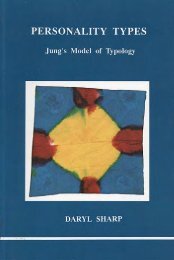Digesting Jung: Food for the Journey - Inner City Books
Digesting Jung: Food for the Journey - Inner City Books
Digesting Jung: Food for the Journey - Inner City Books
Create successful ePaper yourself
Turn your PDF publications into a flip-book with our unique Google optimized e-Paper software.
It’s a Complex Life 11<br />
are influenced by <strong>the</strong>m and how <strong>the</strong>y interfere with our conscious<br />
intentions. As long as we are unconscious of our complexes, we are<br />
prone to being overwhelmed or driven by <strong>the</strong>m. When we understand<br />
<strong>the</strong>m, <strong>the</strong>y lose <strong>the</strong>ir power to affect us. They do not disappear,<br />
but over time <strong>the</strong>ir grip on us can loosen.<br />
A complex is a bundle of associations, sometimes painful, sometimes<br />
joyful, always accompanied by affect. It has energy and a life<br />
of its own. It can upset digestion, breathing and <strong>the</strong> rate at which<br />
<strong>the</strong> heart beats. It behaves like a partial personality. When we want<br />
to say or do something and a complex interferes, we find ourselves<br />
saying or doing something quite different from what we intended.<br />
Our best intentions are upset, exactly as if we had been interfered<br />
with by ano<strong>the</strong>r person.<br />
Complexes can take over to such an extent that <strong>the</strong>y become<br />
visible and audible. They appear as visions and speak in voices that<br />
are like those of definite people. This is not necessarily a pathological<br />
symptom (e.g., schizophrenia). Complexes are regularly personified<br />
in dreams, and one can train oneself so <strong>the</strong>y become visible<br />
or audible also in a waking condition, as in <strong>the</strong> practice of active<br />
imagination. 3 It is even psychologically healthy to do so, <strong>for</strong> when<br />
you give <strong>the</strong>m a voice, a face, a personality, <strong>the</strong>y are less likely to<br />
take over when you’re not looking.<br />
The existence of complexes goes a long way toward explaining<br />
both multiple personality disorders and what <strong>the</strong> helping professions<br />
call lost memory recovery. An early trauma is often at <strong>the</strong><br />
root of such cases. What may happen in response to a painful traumatic<br />
event is that <strong>the</strong> ego dissociates. The self-regulating function<br />
of <strong>the</strong> psyche is activated and creates a complex that dis-remembers<br />
<strong>the</strong> event—it gets buried among <strong>the</strong> detritus of ongoing life. 4 Like<br />
any o<strong>the</strong>r complex, it lies dogg-o in <strong>the</strong> unconscious until something<br />
happens to trigger it.<br />
3 See below, pp. 106ff.<br />
4 See below, pp. 55ff., <strong>for</strong> commentary on <strong>the</strong> self-regulating function of <strong>the</strong> psyche,<br />
a keynote belief in <strong>the</strong> practice of <strong>Jung</strong>ian analysis.










